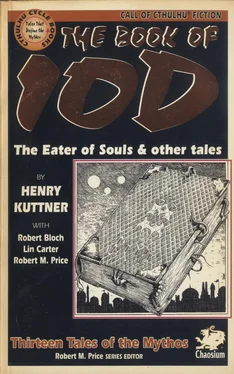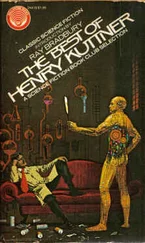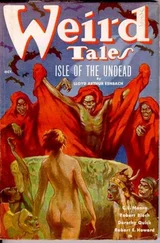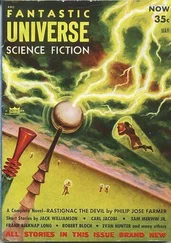Henry Kuttner - The Book of Iod
Здесь есть возможность читать онлайн «Henry Kuttner - The Book of Iod» весь текст электронной книги совершенно бесплатно (целиком полную версию без сокращений). В некоторых случаях можно слушать аудио, скачать через торрент в формате fb2 и присутствует краткое содержание. Год выпуска: 1995, ISBN: 1995, Издательство: Chaosium, Жанр: Ужасы и Мистика, на английском языке. Описание произведения, (предисловие) а так же отзывы посетителей доступны на портале библиотеки ЛибКат.
- Название:The Book of Iod
- Автор:
- Издательство:Chaosium
- Жанр:
- Год:1995
- ISBN:9781568820453
- Рейтинг книги:5 / 5. Голосов: 1
-
Избранное:Добавить в избранное
- Отзывы:
-
Ваша оценка:
- 100
- 1
- 2
- 3
- 4
- 5
The Book of Iod: краткое содержание, описание и аннотация
Предлагаем к чтению аннотацию, описание, краткое содержание или предисловие (зависит от того, что написал сам автор книги «The Book of Iod»). Если вы не нашли необходимую информацию о книге — напишите в комментариях, мы постараемся отыскать её.
The Book of Iod — читать онлайн бесплатно полную книгу (весь текст) целиком
Ниже представлен текст книги, разбитый по страницам. Система сохранения места последней прочитанной страницы, позволяет с удобством читать онлайн бесплатно книгу «The Book of Iod», без необходимости каждый раз заново искать на чём Вы остановились. Поставьте закладку, и сможете в любой момент перейти на страницу, на которой закончили чтение.
Интервал:
Закладка:
One wonders at the tangential role of Michael Leigh in the story. He remains offstage for most of the story, represented by proxy in the form of an inscrutable Oriental colleague. Perhaps it was to mask the fact that Leigh would have played an almost identical role here as in “The Salem Horror", saying almost precisely the same things in both stories, which after all appeared in rapid succession. Just as Bloch became “Tarleton Fiske” and Kuttner became “Keith Hammond” when either had two stories slated for the same issue of Strange Stories, perhaps Michael Leigh in effect assumed an alias as well!
First publication: Weird Tales, June 1937.
1. The Thing in the Waters
Graham Dean nervously crushed out his cigarette and met Doctor Hedwig’s puzzled eyes.
“I’ve never been troubled like this before,” he said. “These dreams are so oddly persistent. They’re not the usual haphazard nightmares. They seem—I know it sounds ridiculous—they seem planned . ”
“Dreams planned? Nonsense.” Doctor Hedwig looked scornful. “You, Mr. Dean, are an artist, and naturally of impressionable temperament. This house at San Pedro is new to you, and you say you’ve heard wild tales. The dreams are due to imagination and overwork.”
Dean glanced out of the window, a frown on his unnaturally pale face.
“I hope you’re right,” he said, softly. “But dreams shouldn’t make me look like this. Should they?”
A gesture indicated the great blue rings beneath the young artist’s eyes. His hands indicated the bloodless pallor of his gaunt cheeks.
“Overwork has done that, Mr. Dean. I know what has happened to you better than you do yourself.”
The white-haired physician picked up a sheet covered with his own scarcely decipherable notes and scrutinized it in review.
“You inherited this house at San Pedro a few months ago, eh? And you moved in alone to do some work.”
"Yes. The seacoast here has some marvelous scenes.” For a moment Dean’s face looked youthful once more as enthusiasm kindled its ashy fires. Then he continued, with a troubled frown. “But I haven’t been able to paint, lately—not seascapes, anyway, it’s very odd. My sketches don’t seem quite right anymore. There seems to be a quality in them that I don’t put there—”
“A quality, did you say?”
“Yes, a quality of malignness , if I can call it that. It’s indefinable. Something behind the picture takes all the beauty out. And I haven’t been overworking these last weeks, Doctor Hedwig.”
The doctor glanced again at the paper in his hand.
“Well, I disagree with you there. You might be unconscious of the effort you expend. These dreams of the sea that seem to worry you are meaningless, save as an indication of your nervous condition.”
“You’re wrong.” Dean rose, suddenly. His voice was shrill.
“That’s the dreadful part of it. The dreams are not meaningless. They seem cumulative; cumulative and planned. Each night they grow more vivid, and I see more of that green, shining place under the sea. I get closer and closer to those black shadows swimming there, those shadows that I know aren’t shadows but something worse. I see more each night. It’s like a sketch I’d block out, gradually adding more and more until—”
Hedwig watched his patient keenly. He suggested, “Until—”
But Dean’s tense face relaxed. He had caught himself just in time. “No, Doctor Hedwig. You must be right. It’s overwork and nervousness, as you say. If I believed what the Mexicans had told me about Morelia Godolfo—well, I’d be mad and a fool.”
“Who is this Morelia Godolfo? Some woman who has been filling you with foolish tales?”
Dean smiled. “No need to worry about Morelia. She was my great-great-grand-aunt. She used to live in the San Pedro house and started the legends, I think.”
Hedwig had been scribbling on a piece of paper. “Well, I see, young man! You heard these legends; your imagination ran riot; you dreamed. This prescription will fix you up.”
“Thanks.”
Dean took the paper, lifted his hat from the table, and started for the door. In the doorway he paused, smiling wryly.
“But you’re not quite correct in thinking the legends started me dreaming, Doctor. I began to dream them before I learned the history of the house.”
And with that he went out.
Driving back to San Pedro, Dean tried to understand what had happened to him. But always he came up against a blank wall of impossibility. Any logical explanation wandered off into a tangle of fantasy. The one thing he could not explain—which Doctor Hedwig had not been able to explain—was the dreams.
The dreams started soon after he came into his legacy: this ancient house north of San Pedro, which had so long stood deserted. The place was picturesquely old, and that attracted Dean from the first. It had been built by one of his ancestors when the Spaniards still ruled California. One of the Deans—the name was Dena, then—had gone to Spain and returned with a bride. Her name was Morelia Godolfo, and it was this long-vanished woman about whom all the subsequent legends centered.
Even yet there were wrinkled, toothless Mexicans in San Pedro who whispered incredible tales of Morelia Godolfo—she who had never grown old and who had a weirdly evil power over the sea. The Godolfos had been among the proudest families of Granada, but furtive legends spoke of their intercourse with the terrible Moorish sorcerers and necromancers. Morelia, according to these same hinted horrors, had learned uncanny secrets in the black towers of Moorish Spain, and when Dena had brought her as his bride across the sea she had already sealed a pact with dark Powers and had undergone a change .
So ran the tales, and they further told of Morelia’s life in the old San Pedro house. Her husband had lived for ten years or more after the marriage, but rumors said that he no longer possessed a soul.
It is certain that his death was very mysteriously hushed up by Morelia Godolfo, who went on living alone in the great house beside the sea.
The whispers of the peons were hereafter monstrously augmented. They had to do with the change in Morelia Godolfo, the sorcerous change which caused her to swim far out to sea on moonlit nights so that watchers saw her white body gleaming amidst the spray. Men bold enough to gaze from the cliffs might catch glimpses of her then, sporting with queer sea creatures that gamboled about her in the black waters, nuzzling her with shockingly deformed heads. These creatures were not seals, or any known form of submarine life, it was averred, although sometimes bursts of chuckling, gobbling laughter could be heard. It is said that Morelia Godolfo had swum out there one night, and that she never came back. But thereafter the laughter was louder from afar, and the sporting amidst the black rocks continued, so that the tales of the early peons had been nourished down to the present day.
Such were the legends known to Dean. The facts were sparse and inconclusive. The old house had fallen into decrepitude, and was only occasionally rented through the years. These rentals had been as short as they were infrequent. There was nothing definitely wrong with the house between White’s Point and Point Fermin, but those who had lived there said that the crashing of the surf sounded subtly different when heard through windows that overlooked the sea, and, too, they dreamed unpleasantly. Sometimes the occasional tenants had mentioned with peculiar horror the moonlit nights, when the sea became altogether too clearly visible. At any rate, occupants often vacated the house hastily.
Dean had moved in immediately after inheriting, because he had thought the place ideal for painting the scenes he loved. He had learned the legend and the facts behind it later, and by this time his dreams had started.
Читать дальшеИнтервал:
Закладка:
Похожие книги на «The Book of Iod»
Представляем Вашему вниманию похожие книги на «The Book of Iod» списком для выбора. Мы отобрали схожую по названию и смыслу литературу в надежде предоставить читателям больше вариантов отыскать новые, интересные, ещё непрочитанные произведения.
Обсуждение, отзывы о книге «The Book of Iod» и просто собственные мнения читателей. Оставьте ваши комментарии, напишите, что Вы думаете о произведении, его смысле или главных героях. Укажите что конкретно понравилось, а что нет, и почему Вы так считаете.







